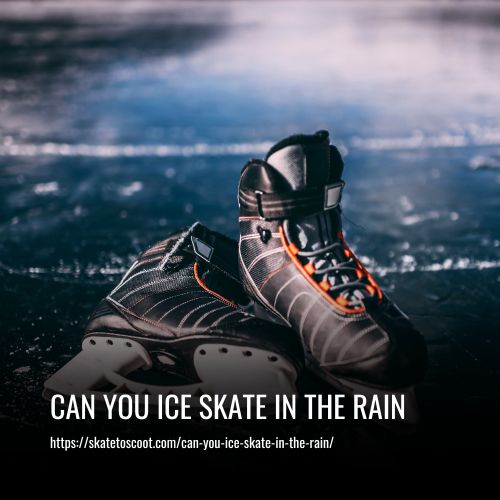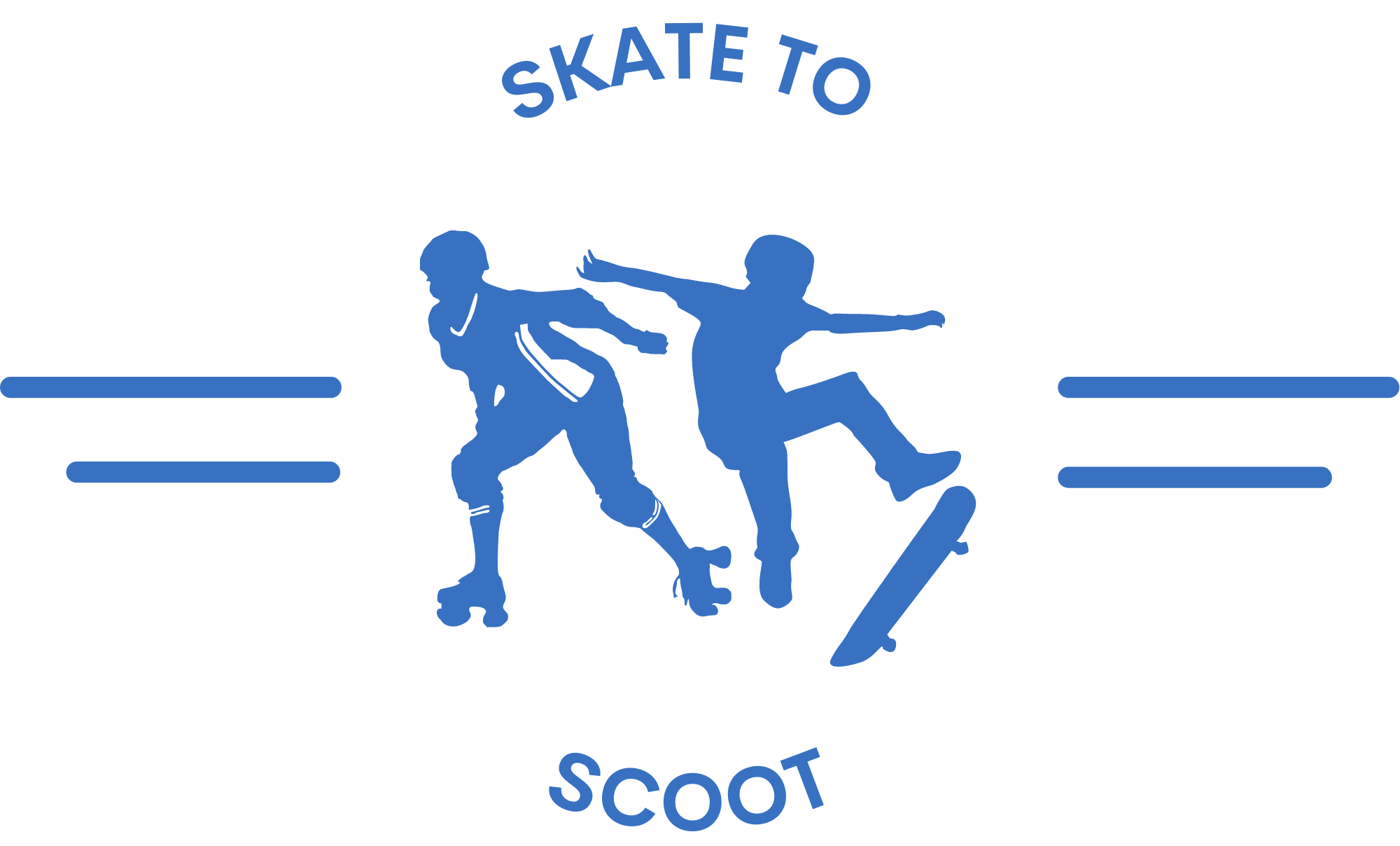Can You Ice Skate in the Rain? Risks & Safety Tips
This post contains affiliate links. As an Amazon Associate, we earn from qualifying purchases.
Ice skating in the rain is possible, but certainly not advisable. While it can be a fun activity, it carries certain risks, especially when done on frozen ponds, rivers, or lakes. Excess warmth from the rain can cause these ice surfaces to cave in, putting your life at risk.
Those who opt for outdoor ice skating in rainy conditions also face additional hazards than dry-weather skaters. On slippery surfaces, you’re more likely to experience an accidental fall and get injured. Furthermore, stopping on wet ice is much harder than on dry ice so fatigue can set in quickly if you are not used to it.
Finally, exposure to cold and damp weather increases the risk of hypothermia and water can even damage your blades if left unprotected for too long. Therefore, although you may be able to go ice skating in the rain, safety should always come first so make sure to take precautions before taking to the ice!

Is It Harder to Ice Skate in the Rain?
Ice skating in the rain can be harder than usual due to the presence of water. Water is a lubricant on ice, which means that it can make it more difficult for a skater to stay on balance as they move across the rink.
Furthermore, wet surfaces can lead to less friction and less stable footing, making it potentially more dangerous for those inexperienced in ice skating.
Is It Dangerous to Ice Skate in the Rain?
Ice skating in the rain can be dangerous if you’re not careful. Despite the fact that it is technically safe to skate on a wet rink, falling and getting wet makes it more uncomfortable and potentially hazardous if you don’t have proper safety equipment on.
It’s important to note that due to the weather conditions such as unseasonably warm weather, high winds, or a combination of both, these elements can affect the surface of an outdoor ice rink, making it more slippery and harder to maneuver, increasing the risk of injury if you slip or fall.
It’s recommended then that only experienced skaters should attempt to skate in the rain if at all possible. Even then, they should always wear protective gear such as padding and a helmet to help protect against any potential accident when gliding on wet ice.
Risks And Challenges of Ice Skating in the Rain
To help you make the right decision, I am giving you additional information about each challenge and risk.
1. Frozen Ponds or Lakes Can Cave in While Skating
One of the major risks and challenges of ice skating in the rain is that frozen ponds and lakes can cave in while you are skating. If a pond or lake is already frozen, additional rainwater adds warmth which causes the ice to melt faster than normal – making it weaker and more prone to collapsing.
Skating in a deep lake, river, or pond can be very dangerous if you don’t have good swimming skills.
2. Slippery Surfaces Increase the Chances of Falling and Hurting Yourself
The risk of slipping and falling while ice skating in the rain is greatly increased. Slippery surfaces make it much easier to fall and cause greater chances of hurting yourself.
Falling increases your probability of getting injured, which can have monetary repercussions as medical expenses are often required.
According to the National Library of Medicine, possible injuries from a fall include fractures, abrasions, or sprains and the feet or ankles may be hurt if one slip while ice skating on slippery ice.
3. Stopping is a Hassle
Ice skating becomes difficult when it rains, as stopping becomes challenging due to the slippery surface. The primary ice skating-stopping techniques like snowplow or T-stop can be difficult to execute as there’s often little to no friction on the surface.
There is also a risk of falling if done incorrectly and this can cause you to hurt yourself or drench your clothes if you fall on the water. So, it’s essential to make sure that proper safety precautions are taken whenever you go ice skating in the rain!
4. Increased Risk of Hypothermia
The dangers of ice skating in the rain are real, and one of the biggest is the increased risk of hypothermia. Hypothermia is a very serious problem that can occur when your body temperature falls below 95 degrees F (35 degrees C).
If you’re not sheltered from the cold and wet weather, you’re more prone to hypothermia. Hypothermia may cause breathing difficulties, dizziness or loss of consciousness, seizures, and even death in extreme cases.
5. Water can Damage Your Ice Skate Blades
Water can cause serious damage to ice skate blades. If it gets inside the rink and onto the blades, this could lead to corrosion or rust, significantly weakening the blade and making it more susceptible to fractures or breaks when skating.
This means that you need to always be mindful of how much water is in the rink, and check for signs of damage before you skate on the ice.
Is It Safe to Ice Skate in Light Rain?
Ice skating in a light rain can be safe if certain precautions are taken. To remain safe on the ice, make sure not to soak your hands or feet in the water.
This will help to make sure that you don’t slip or fall while skating. It is also a good idea to check the weather forecast before heading out for a skate session, as heavy rain can create unsafe skating conditions.
If it starts raining heavily, it might be better to stick to indoor ice skating until the rain stops and the playing surface gets dry again. Taking these measures will help ensure that you have an enjoyable and safe ice skating experience, regardless of what the weather may bring!
Tips for Ice Skating in the Rain
If you want to ice skate in the rain, you need to know a few tips. Before you step onto the ice, make sure you dress appropriately in water-resistant clothes. Avoid heavy clothes that will weigh you down and make it more difficult to stay afloat.
Once on the ice, start off slowly until you’re more confident in your abilities. As you get more comfortable and coordinated, then increase your speed accordingly. Finally, be aware of potential hazards like frozen ponds or lakes with thin ice and avoid skating on this type of terrain.
By following these simple tips for ice skating in the rain, you can enjoy skating outdoors in seasonally wet weather without any worry or danger.
FAQs
Ice skating is possible when the temperature is above freezing, although the quality of the ice might not be as good as when it’s below freezing.
If you skate on ice when it’s raining, your skates can become damaged and you could require new ones.
When skating in the rain or on a wet surface, your bearings may become less efficient. Make sure to clean them afterward so there won’t be any permanent damage.
Skating in the rain or on wet surfaces can damage the bearings of your skates and lower their performance. Make sure to clean them afterward to prevent further harm.
Conclusion
In conclusion, ice skating in the rain is entirely possible but not always ideal. When done properly, it can be a great way to experience the joys of skating without braving cold weather or icy conditions. However, make sure to use caution when skate-surfing and wear the proper gear to avoid any injuries from falls.
As long as you take the necessary precautions, don’t let the rain keep you away from the ice – go out and enjoy your favorite winter sport!
